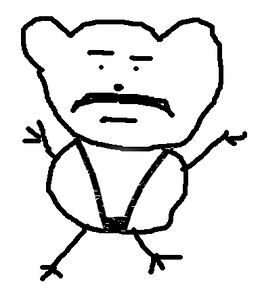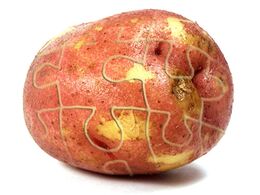HowTo:Write An Article That Stands No Chance Of Featuring On Uncyclopedia

|
HowTo This article is part of Uncyclopedia's HowTo series. See more HowTos |

“I maed a yuky doody!”
HowTo:Write An Article That Stands No Chance Of Featuring On Uncyclopedia is one of the more popular guides amongst the HowTo section on Uncyclopedia, famed, as it is, for its blatant self-referencing.
From its inception a small minority of contributors have sought to have their work featured on the "comedy" website Uncyclopedia. A much larger group, however, have made it their goal to contribute articles that stand little to no chance of becoming a featured article. Over the years regular users began to work out patterns that would increase the likelihood of not having their work featured. Despite some accusations that these methodologies lead to a tired and predictable format a number of users regularly come up with a new take and produce non-featurable content that is at once new, unique and vibrant.
Finding a topic that is obscure, vague and/or difficult to understand is often a good place to begin, as immediately you are alienating the majority of contributors, and therefore voters, on the site. A topic or a source of humour that is perculiar to your little backwater place of residence will help to make your article difficult to understand except for a small minority of weirdos. Taking a topic that is only known within your own culture will allow for xenophobic voters to vote in the negative citing "too British-centric", "too US-centric" or whatever crappy place it is that you come from. Self-referencing and meta-humour will allow accusations of "too injokey" to be levelled at your work, again increasing its likelihood never to be featured.
Subject Matter
Subject matter for your article is one of the key elements that should make sure that your article is never featured. People are easily offended, but if you put your mind to it you could use your article to leave some lasting emotional damage. Destroying a much loved childhood memory, targeting a national or cultural tragedy or producing something whose mental imagery will leave a lasting scar on the psyche of the reader are all good and valid goals, and are guaranteed to improve your chances of not having your article featured.
Areas to consider include:
- Items of an Offensive nature.
- Racist, stereotypical perceptions of homosexuality or Politically Incorrect subjects.
- Topics of a sexual nature and those that deviate from the norm.
- Involving a First World War Flying Ace.
- Lists. Who doesn't love them?
Of course staying on subject is not seen as important as it would be were you aiming to have your work featured. Repetitiveness, randomness and repetitiveness are also useful factors to consider. Aardvark.
Suitable Imagery
"A picture paints a thousand words", as the old saying goes. However, this popular line was clearly written in the days before the formation of Uncyclopedia. In most cases images on Uncyclopedia only manage to paint a small number of words (frequently two or less), often of a juvenile or scatological nature. Many people believe that this is due to a site policy that argues against text-based humour, whilst others believe it is due to the fact that any idiot can upload the image of his choice to the server almost without fear of reproach.
It is often the case that people will utilise images for the purpose of improving the look and layout of an article, whilst at the same time maintaining a relevance to the article subject matter. When trying to write an article designed to have no chance of featuring these rules can be binned. This allows the author a much greater freedom in their work.
Not everyone has access to the best image manipulation software or the necessary skills to create quality images. In this case it is perfectly acceptable to go and steal other people's work.
Proper Use of Quotations
Quotes within your article can be funny as well as clever. However in trying to assist in your quest of writing non-featurable content the best approach to aim for is one of extreme annoyance. Repetitiveness, randomness and repetitiveness are also useful factors to consider.
“Use Lots”
“Of Pointless Quotes”
“Aardvark”
Repetitiveness, randomness and repetitiveness are also useful factors to consider.
In Conclusion
As you can see creating an article that meets the low standard required for non-featuring is a lot more work that many people give the authors credit for. It takes real skill and a mastery of the arts to become proficient.
With regular practice you can become expert in generating a prepossession to preclude objective judgment about your work, just by having your name attached to the article. Utilising this tried and tested methodology your chances of having your work featured can be greatly reduced. Added to this, the predilection of most contributors on Uncyclopedia in not bothering to actually read articles this may be increased even further. Remain mindful though, that innovations in comedy may over time make your efforts to act counter to internet culture null and void.
See Also
- VFH
- HowTo:Write a Funny Article
- List of Non-Featurable Content
- I don't get it
- Euroipods
- UnBooks:The Miseries of Uncyclopedia Life
- This Article Is Worthless
| Featured version: 4 September 2008 | |
| This article has been featured on the main page. — You can vote for or nominate your favourite articles at Uncyclopedia:VFH. | |


